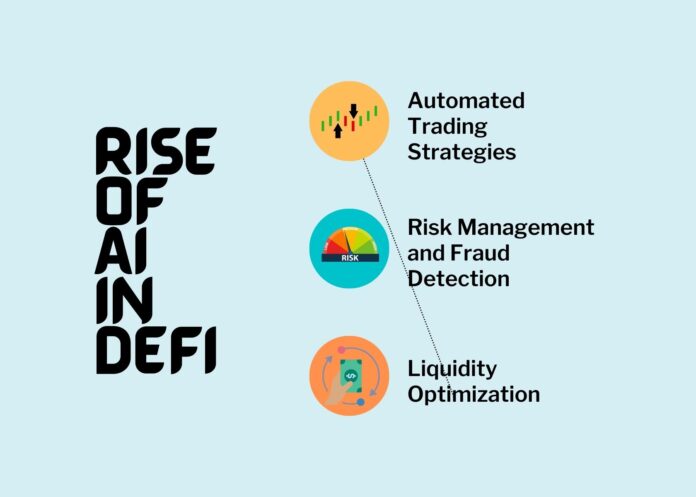The rapid advancements in artificial intelligence (AI) technologies have had a profound impact on various industries, and the decentralized finance (DeFi) sector is no exception.
The integration of AI-powered solutions has become increasingly common, transforming the way DeFi strategies are developed, implemented, and managed.
Rise of AI in DeFi
The decentralized nature of DeFi, with its reliance on distributed ledger technologies and smart contracts, has created an environment that is well-suited for the integration of AI.
DeFi platforms and protocols are often characterized by complex data sets, real-time market fluctuations, and the need for rapid decision-making.
Hence, AI-powered systems can analyze this wealth of data, identify patterns, and make informed decisions more efficiently than traditional methods.
Automated Trading Strategies
One of the most significant applications of AI in DeFi is the development of automated trading strategies.
AI algorithms can analyze market trends, identify arbitrage opportunities, and execute trades with speed and precision that surpasses human capabilities.
This has led to the emergence of AI-powered trading bots and platforms that can optimize portfolio management, minimize risk, and maximize returns for DeFi investors.
Risk Management and Fraud Detection
AI-powered systems are also playing a crucial role in risk management and fraud detection within the DeFi ecosystem. By leveraging machine learning algorithms, these systems can identify anomalies, detect suspicious activities, and mitigate potential vulnerabilities in DeFi protocols. This enhances the overall security and stability of the DeFi landscape, providing greater confidence for users and investors.
Liquidity Optimization
Liquidity is a critical component of DeFi, and AI-powered solutions help to optimize liquidity management.
AI algorithms can analyze market data, user behavior, and protocol parameters. This will help to identify the most efficient ways to allocate and manage liquidity. Moreover, it will ensure that DeFi platforms maintain the necessary liquidity to facilitate seamless transactions and avoid liquidity crunches.
Challenges and Considerations
While the integration of AI in DeFi presents numerous opportunities, there are also challenges and considerations that must be addressed.
Transparency and Explainability
One of the key challenges is ensuring the transparency and explainability of AI-driven decision-making processes.
DeFi, by its nature, emphasizes decentralization and transparency, which can be at odds with the “black box” nature of some AI models.
Developing AI systems that are transparent and accountable is crucial for building trust and adoption within the DeFi community.
Regulatory Landscape
The regulatory landscape surrounding the intersection of AI and DeFi is still evolving, with varying approaches and guidelines across different jurisdictions.
Therefore, DeFi platforms and developers must navigate this complex regulatory environment to ensure compliance and mitigate legal risks.
Data Availability and Quality
The effectiveness of AI-powered solutions in DeFi is heavily dependent on the availability and quality of data. Ensuring the integrity, reliability, and accessibility of DeFi data is essential for AI systems to make accurate and informed decisions.
Future Outlook and Opportunities
The integration of AI in DeFi will continue its growth trajectory, with the potential to unlock new opportunities and transform the landscape.
Personalized Investment Strategies
AI-powered systems can use user data and preferences to develop personalized investment strategies, catering to the unique needs and risk profiles of individual DeFi investors. Hence, this level of customization can enhance user engagement and improve overall investment outcomes.
Predictive Analytics and Forecasting
AI algorithms can harness the vast amount of data generated within the DeFi ecosystem to develop predictive analytics and forecasting models.
Hence, these models can provide valuable insights into market trends, asset valuations, and potential risks, allowing DeFi participants to make more informed decisions.
Automated Governance and Decision-Making
As DeFi protocols become more sophisticated, AI-powered systems can play a role in automated governance and decision-making processes.
These systems can analyze proposals, simulate outcomes, and assist in the execution of governance decisions, enhancing the efficiency and transparency of DeFi protocol governance.
Conclusion
The integration of Artificial Intelligence in DeFi strategies and management has already demonstrated its transformative potential. The future holds even greater opportunities!
By using the power of AI, DeFi platforms can optimize trading, enhance risk management, and improve liquidity. This will ultimately help in driving the growth and adoption of decentralized finance.
As the DeFi ecosystem continues to evolve, the continued collaboration between AI and DeFi will be crucial in shaping the future of this dynamic and innovative sector.



